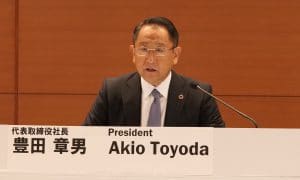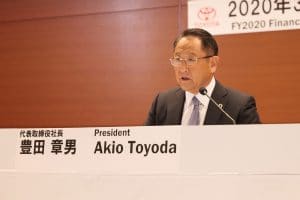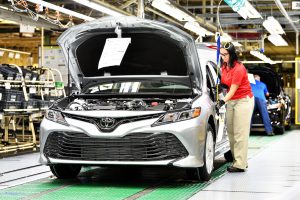
Toyota’s Chief Executive Officer Akio Toyoda told shareholders that the automaker would remain in the black despite the current economic downturn.
Like its major competitors, Toyota has been hard hit by the coronavirus pandemic and the economic chaos it has triggered around the world, but the automaker’s Chief Executive Officer Akio Toyoda advised shareholders on Thursday that he expects to see the Japanese giant remain in the black.
For the fiscal year that ended on March 31, Toyota saw its net income increase from $17.5 billion to $19.35 billion, in stark contrast with its main domestic rival, Nissan, which delivered its first deficit in years. But the pandemic is expected to take a toll, nonetheless, Toyota in May warning that earnings for the current fiscal year are likely to fall 80%.
“We can secure (an operating) profit,” CEO Toyoda, the grandson of the automaker’s founder, promised shareholders during their annual meeting in Tokyo on Thursday.
(Toyota gains in fiscal year but warns about year ahead.)
The numbers are certain to be significantly smaller than what Toyota has delivered since the industry emerged from the Great Recession. The 500 billion yen, or $4.65 billion, operating profit forecast last month not only would be an 80% year-over-year decline but would mark a nine-year low.
The automaker has outlined a series of cost-cutting measures it intends to pursue to remain in the black, unlike a number of global competitors whose earnings have vanished in the wake of the pandemic and subsequent global sales collapse. A study released by consultancy AlixPartners last week forecast that worldwide light vehicle demand for 2020 will dip to 70.5 million, a 20% year-over-year decline.
The critical U.S. market, meanwhile, is widely expected to come in at under 13 million vehicles for the year, down from 17.1 million in 2019. The impact of the pandemic was readily apparent in Toyota’s own numbers, May U.S. demand dipping by 25.7% compared to the year before.
The pandemic’s impact was also apparent during the annual shareholder’s meeting where just 360 people turned out, according to the automaker, down from the record 5,546 who attended the 2019 meeting. It was also the shortest annual meeting in two decades, wrapping up in just 80 minutes.
(Toyota cutting NA production by a third through October.)
Even then, the company took extensive precautions. Among other things, the automaker required attendees to first have their temperatures checked and then set up transparent partitions in front of speakers. It also limited the number of available seats to promote social distancing.
Prior to the annual event, Toyota recommended to shareholders that they vote on resolutions either by mail or Internet and not attend in person unless necessary.
The coronavirus-caused crisis “exceeds the Lehman shock,” said Toyoda, a reference to the collapse of the major Wall Street investment house whose failure has been blamed for sending the global economy into a tailspin a decade ago.
But the CEO insisted Toyota will come through this crisis better than it did a decade ago, telling shareholders, “We are different today from what we were during the financial crisis.”
Worldwide, Toyota is still struggling to adapt to the pandemic, however. In the U.S., for example, it continues to ramp up production after a roughly two-month shutdown.
(Toyota reveals “flexible” plan aimed at safely starting to re-open U.S. plants.)
There have been some questions raised about how Toyota might deal with operations in different parts of the world, especially in Japan. A number of domestic competitors have cut back production there in recent years, responding to rising costs. But Mitsuru Kawai, Toyota’s chief human resources officer stressed to shareholders that there are no plans to trim the 3 million cars annually built in the company’s home market plants, despite the coronavirus crisis.


